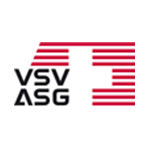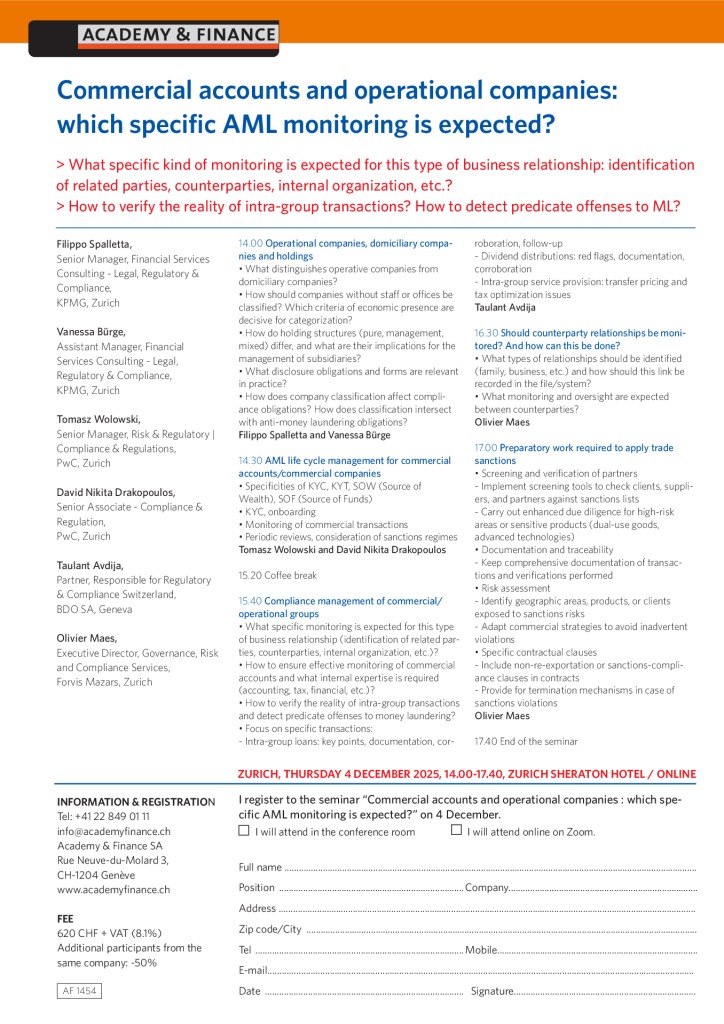What specific kind of monitoring is expected for this type of business relationship: identification of related parties, counterparties, internal organization, etc.?
How to verify the reality of intra-group transactions? How to detect predicate offenses to ML?Operational companies, domiciliary companies and holdings
- What distinguishes operative companies from domiciliary companies?
- How should companies without staff or offices be classified? Which criteria of economic presence are decisive for categorization?
- How do holding structures (pure, management, mixed) differ, and what are their implications for the management of subsidiaries?
- What disclosure obligations and forms are relevant in practice?
- How does company classification affect compliance obligations? How does classification intersect with anti-money laundering obligations?
AML life cycle management for commercial accounts/commercial companies
- Specificities of KYC, KYT, SOW (Source of Wealth), SOF (Source of Funds)
- KYC, onboarding
- Monitoring of commercial transactions
- Periodic reviews, consideration of sanctions regimes
Compliance management of commercial/operational groups
- What specific monitoring is expected for this type of business relationship (identification of related parties, counterparties, internal organization, etc.)?
- How to ensure effective monitoring of commercial accounts and what internal expertise is required (accounting, tax, financial, etc.)?
- How to verify the reality of intra-group transactions and detect predicate offenses to money laundering?
- Focus on specific transactions:
- Intra-group loans: key points, documentation, corroboration, follow-up
- Dividend distributions: red flags, documentation, corroboration
- Intra-group service provision: transfer pricing and tax optimization issues
Should counterparty relationships be monitored? And how can this be done?
- What types of relationships should be identified (family, business, etc.) and how should this link be recorded in the file/system?
- What monitoring and oversight are expected between counterparties?
Preparatory work required to apply trade sanctions
- Screening and verification of partners
- Implement screening tools to check clients, suppliers, and partners against sanctions lists
- Carry out enhanced due diligence for high-risk areas or sensitive products (dual-use goods, advanced technologies)
- Documentation and traceability
- Keep comprehensive documentation of transactions and verifications performed
- Risk assessment
- Identify geographic areas, products, or clients exposed to sanctions risks
- Adapt commercial strategies to avoid inadvertent violations
- Specific contractual clauses
- Include non-re-exportation or sanctions-compliance clauses in contracts
- Provide for termination mechanisms in case of sanctions violations
SPEAKERS
Filippo Spalletta, Senior Manager, Financial Services Consulting – Legal, Regulatory & Compliance, KPMG, Zurich
Vanessa Bürge, Assistant Manager, Financial Services Consulting – Legal, Regulatory & Compliance, KPMG, Zurich
Tomasz Wolowski, Senior Manager, Risk & Regulatory | Compliance & Regulations, PwC, Zurich
David Nikita Drakopoulos, Senior Associate – Compliance & Regulation, PwC, Zurich
Taulant Avdija, Partner, Responsible for Regulatory & Compliance Switzerland, BDO SA, Geneva
Olivier Maes, Executive Director, Governance, Risk and Compliance Services, Forvis Mazars, Zurich
Commercial accounts and operational companies: which specific AML monitoring is expected?
I wish to see this past conference on zoom
Contact by the phone
ACADEMY & FINANCE SA
Rue Neuve-du-Molard 3
1204 Genève
Switzerland
T + 41 (0)22 849 01 11
E info@academyfinance.ch


